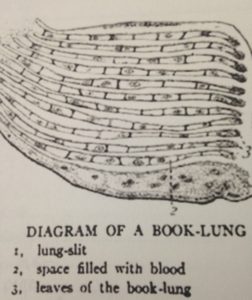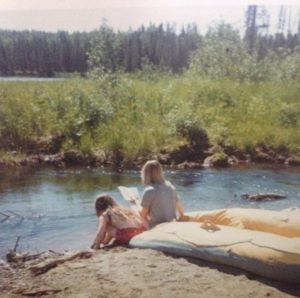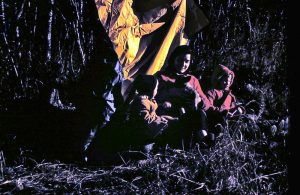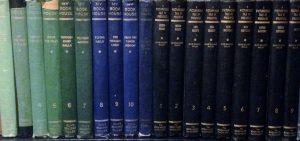A Portable Feast
wilderness storytelling – family album
My parents were story tellers. And they both loved books. Stories are as portable as brains. I am reminded of Ernest Hemingway’s A Moveable Feast. Whether you’re camping in the high country or hunkered down for a long winter’s night: a story is always available. And yet, no matter where we lived – Unalakleet, Yakutat, McGrath, Homer, Anchorage etc.: there were also books. Always.
the fabulous, well-traveled BookHouse books – family album
In the early days those books were shipped along with cast iron skillets and sleeping bags. I distinctly recall Dad prying off the lid of a large cardboard barrel and beneath a tanned and folded moose hide, buttery soft – the BookHouse books.

Breathing with book lungs
Book lungs are organs of respiration that some arachnids, such as spiders and scorpions, have. I like using book lungs as a metaphor.
When I think of paper: letters, notes, journals, books of all description – I think of book lungs as a metaphor of how we who love the written word breathe, how we inhale the musty vanilla scent of old volumes, and the imagined spices of faraway places, or the sharp coppery smells of blood, or the sudden intense odors of ozone as rain strikes pavement. We breathe in the details and ideas of other lives, other times: we use our book lungs.
Page-thin time machines
Once, while living in the Mat-Su Valley, I wrote a book review column for the local newspaper, The Frontiersman. The Unicorner was painstakingly typed on a child’s manual typewriter. Deadlines were met, but the copy felt like a kind of braille – there were that many accretions of whiteout. In The Unicorner the underlying premise was that books are time machines.
That premise holds true to this day. I unpack books now and every time I open one, even for a cursory glance, I am transported. Not only are the details of the story recalled, but the setting where the book was read and the frame of mind with which it was read.
The sense-memory of books
For years, I would start off every summer break by re-reading The Hobbit and Tolkien’s Trilogy. Scandinavian Lefse, apple slices and cinnamon accompanied that ritual. To this day, a whiff of cinnamon transports me to Middle Earth. Homemade fudge takes me into the homey yet sharp pages of Louisa May Alcott. Espresso: Anaïs Nin. Restless nights: Hesse’s Steppenwolf. Strangely enough, granola and honey transports me right back to Nietzsche. Evening fog echoes with Agatha Christie. Morning fog: Twain, Chekhov, and DH Lawrence. Midnight train whistles: Bradbury, Faulkner. The iambic of rain: Shakespeare, the mood of rain: Austen. Neon lights sputtering at around 3 AM: Heinlein, Philip K. Dick, Gibson, Gaiman. News reports: Atwood, Clarke, Bacigalupi, Swift, Orwell. Christmas lights: Capote. Shades of ocean blue, layer after layer of sea glass: Melville. Photos of childhood holidays: Eugene O’Neill, Dylan Thomas, Tennessee Williams. The canvas walls of tents: Bashó, Lao Tse Tung, The Poetic Edda. The list goes on and on. It is a daunting delight to know that no matter how long I live I will never be able to read enough.

Camping with books, Mama Bear Lake – family album
Once my daughter and I were driving, having one of our long and rambling car talks: a great way to decompress and debrief each other about the day we’d had. We pulled back into a sleepy Sunday neighborhood. A young girl, maybe thirteen. sat on a low stone wall. Her back nestled against a tree. A book opened on her lap. If I was a photographer I would have shot a roll of film. If I were skilled with charcoal I would draw her likeness. Instead, I commit it to memory. The utter stillness and precise intention of a reader, unfettered and traveling through time.



Books are certainly timeless connectors to personal history and memories. I have apple boxes of treasured books that have been with me since the 1980s, memories of a time in the late 70s when I lost all the books I had accumulated before that. The apple boxes have traveled 10,000 miles and are covered in tape. When I slide the top off the box all kinds of things drift out; memories of past reading, excitement at insights reawakened, guilt at essays and monographs not yet completed (some day). I want to get the books from the boxes to the shelves so I can see them more often. But, then I would still need to stored the treasured boxes. As I sort through piles and shelves of books these days, trying to condense my collection to the truly meaningful and useful, I find myself quickly lost in the memories. I think I will not finish the sorting.
I can picture those apple crates filled with stories.